Table of Contents
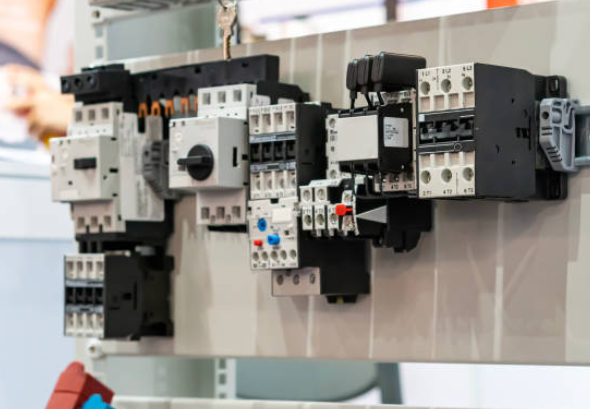
Electrical contactors, as one of the primary components in an air conditioning unit, are essential in orchestrating its smooth functioning and keeping inefficiency to a minimum or shutting off altogether.
However, like any component, AC contactor failure can leave an embarrassing cascade of cooling inefficiencies or complete shut off behind its wake.
This comprehensive guide explores common failure symptoms of an AC contactor as well as where to buy replacements while providing recommendations based on quality AC contactors.
Common Signs of AC Contactor Failure: Keep an Eye Out
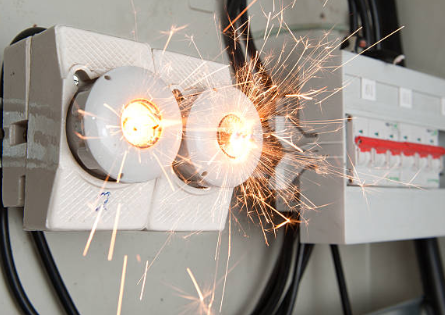
When the AC contactor fails, it can lead to noticeable issues with your air conditioning system. Here are some clear signs that indicate a potential contactor problem:
1. AC Won’t Turn On
If the contactor on AC unit doesn't respond when you try to turn it on, a faulty contactor could be preventing the electrical circuit from completing.
2. AC Contactor Not Pulling In
One of the key indicators that an AC contactor has failed is when it doesn't "pull in", or engage.
This miscommunication between your unit's electrical circuitry and compressor/fan motor stops electricity flowing smoothly resulting in your AC failing to start or function correctly.
3. Physical Damage: Burnt or Melted Contactor Elements
Upon visual inspection, if you notice any signs of overheating, such as burnt or melted components at the contactor, it’s a clear indicator of failure.
A burned contactor is the sure sign of trouble in any AC system, signaling it's time for replacement parts to be installed. Over time, electrical contacts within its contactor may wear down due to wear-and-tear, leading to poor conductivity and excessive heat production.
It in turn burns it resulting in visible damage or an unpleasant aroma, alerting owners it's time for replacements.
4. Buzzing or Chattering Noises from Contactors
Buzzes coming from your contactor is an indicator that something may be amiss with its electrical connection; such as weak coils, loose connections or degraded contacts causing buzzes to make an audible buzzing sound when used on AC systems.
Do not ignore such symptoms! They could indicate serious trouble.
Reasons behind AC Fail
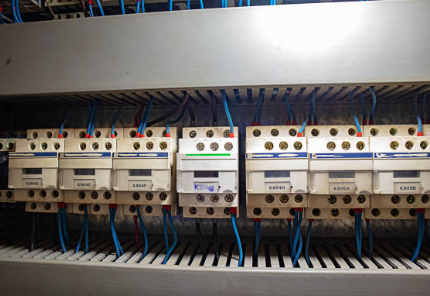
AC contactor failure can result from several factors, often related to both physical wear and electrical issues. Here are the primary causes:
- Electrical Overload: Excessive current can cause the contact points to overheat and weld together, leading to failure.
- Age and Wear: Over time, the mechanical parts of a contactor can wear out, and the electrical contacts can degrade, resulting in poor performance or failure.
- Poor Maintenance: Dirt, insects, and corrosion can interfere with the contactor's operation, preventing it from closing or opening properly.
- Loose Connections: Loose electrical connections can cause erratic contactor operation and may lead to overheating and damage.
- Voltage Fluctuations: Fluctuations in the power supply can damage the contactor coil, preventing it from engaging or disengaging correctly.
- Short Circuits: A short circuit in the AC unit can cause excessive current flow through the contactor, damaging it over time.
- Mechanical Failure: The physical failure of the coil spring or armature can prevent the contactor from operating, often due to material fatigue or mechanical stress.
Troubleshooting AC Contactor Failure: A Straightforward Approach
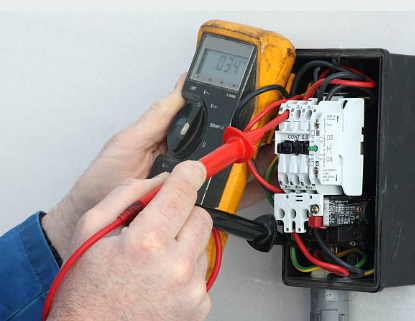
When your AC stops working, one of the first components to check is the contactor. After checking the AC contactor symptoms, here's how to troubleshoot it effectively:
-
Turn Off Power: Always begin by shutting off the power at your home's breaker box to avoid shock risks.
-
Inspect Visually: Look at the contactor for any obvious signs of damage such as burns, wear, or corrosion. These physical signs can directly indicate failure.
-
Listen: After ensuring it's safe, power on the unit briefly to listen for any buzzing or chattering sounds from the contactor. These noises suggest malfunction.
-
Multimeter Test: Use a multimeter to check the coil's continuity. If you don't get a reading, the coil might be defective.
-
Check Connections: Make sure all electrical connections are secure. Loose connections can lead to operational issues.
-
Manual Test: With the power off, try pushing the contactor down. If it doesn't move smoothly or is stuck, replacement of AC contactors might be necessary.
DIY Diagnosis and Replacement Options
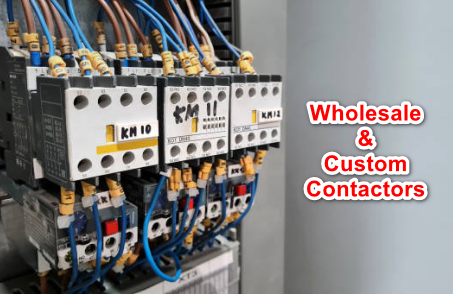
A DIY AC contactor replacement project may present itself to homeowners with enough experience and the appropriate precautions in mind. When making this DIY choice, be mindful to take safety into consideration at every turn and adhere to safety protocols when performing this task.
When searching for replacing contactor on AC unit online or locally hardware stores may offer suitable components; but for reliable contactors supply specialists you might consider exploring specialisation as your source.
Where to Buy AC Contactor?
Navigating the myriad of options for AC contactor replacements can be daunting. For those seeking reliability and quality, specialized HVAC platforms offer the assurance of finding the right part for your needs. Among these, CircuitBreakerSpace emerges as a reputable supplier, providing a wide array of contactors suitable for various AC models and requirements.
Bonus Recommendation: High-Quality Three-Phase AC Contactor with Thermal Relay
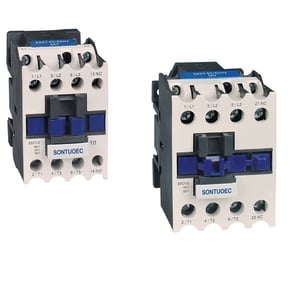
CircuitBreakerSpace provides commercial or high-capacity AC units looking for excellence an exceptional product: an advanced three-phase AC contactor equipped with thermal relay. Not only will this combination ensure efficient power distribution between phases but it will also add an additional level of protection from overheating that helps guard against system damage.
-
Other Custom Contactor Series for you:
DC Contactor
FAQs
1. What does an AC contactor do?
An AC contactor is an electrical switch that controls the flow of electricity to the air conditioner's compressor and condenser fan motor. It engages or disengages the power supply, allowing the AC unit to start or stop cooling as needed.
2. How do I know if my AC contactor is bad?
Signs of a bad AC contactor include the air conditioning unit not turning on, the unit not cooling properly, a visible burn or damage on the contactor, a chattering or buzzing noise coming from the contactor, or the contactor coil not pulling in.
3. Can AC work without contactor?
No, an AC cannot work without a contactor. The contactor is crucial for starting the unit by connecting the power to the compressor and the fan motor. Without it, the electrical circuit remains open, and the AC unit cannot operate.
4. What causes a contactor to go out?
A contactor can go out due to various reasons, including electrical surges, overuse, age, loose connections, a buildup of dirt or insects, or physical damage to the contacts or coil. Regular wear and tear over time is also a common cause.
5. What do HVAC contactors do?
HVAC contactors serve a similar role as AC contactors but in a broader range of heating, ventilation, and air conditioning systems. They control the flow of electricity to various components of the HVAC system, such as the air conditioning compressor, the blower motor in a furnace, or other heating elements, facilitating the start and stop processes of heating or cooling cycles.
6. Is Alternate Current Contactor the same as Air Conditioning Contactor?
Yes, "Alternating Current Contactor" can also be used to refer to an AC contactor, especially in a broader electrical context where "AC" stands for "Alternating Current." In the realm of HVAC (heating, ventilation, and air conditioning), when we say "AC contactor," it typically refers to an Alternating Current Contactor specifically designed for use in air conditioning units to control the flow of electricity to the compressor and the condenser fan motor.
Conclusion
Recognizing the symptoms of AC contactor failure is critical in maintaining both its efficiency and longevity of your cooling system. From inability to pull in through to burnt-smelling buzzes and burning, staying vigilant could prevent discomfort as well as costly repairs down the line.
Educate yourself about symptoms relating to contactor malfunction, while making smart choices so your AC remains reliable throughout its service lifecycle!
